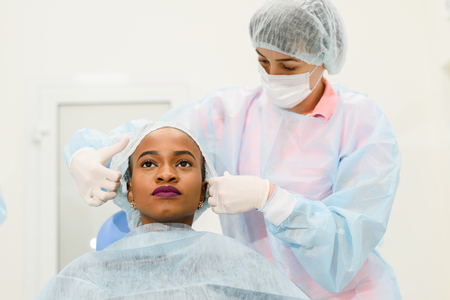Understanding Indian Skin Types and Common Concerns
For every Indian bride-to-be, achieving radiant, flawless skin before the big day is a top priority. However, understanding your unique skin type and addressing concerns specific to Indian skin is essential for an effective pre-wedding facial routine. Indian skin tones range from fair to deep brown, often featuring combination or oily textures that can react differently to climate and products compared to Western skin types. Due to India’s humid summers and dry winters, many brides struggle with pigmentation, uneven skin tone, acne breakouts, and heightened sensitivity. These issues can be aggravated by environmental factors like pollution, harsh sunlight, and even traditional wedding makeup. Additionally, cultural practices such as frequent use of turmeric or home remedies can influence skin health positively or negatively. Recognising these common challenges helps brides make informed decisions about which facials and skincare routines are truly beneficial in the Indian context. By tailoring your pre-wedding facial care to your specific needs, you ensure your skin glows naturally throughout all your wedding festivities.
2. Essential Pre-wedding Facial Dos for Indian Brides
Preparing your skin for the big day is a cherished tradition in Indian weddings, blending ancient rituals with modern skincare science. Here are the key steps and recommended skincare rituals that every bride-to-be should follow to achieve glowing, flawless skin on her wedding day.
Key Steps for Pre-wedding Skincare
- Start Early: Begin your skincare regimen at least three to six months before the wedding for best results.
- Cleansing and Exfoliation: Gentle daily cleansing and weekly exfoliation help remove impurities and dead skin cells, allowing your natural radiance to shine.
- Hydration: Use lightweight, non-comedogenic moisturisers suitable for your skin type to keep the skin plump and hydrated.
- Sun Protection: Apply a broad-spectrum sunscreen every day, even indoors, to protect against UV damage and pigmentation.
Traditional Indian Practices
The beauty of Indian bridal skincare lies in its fusion of traditional rituals and contemporary treatments. The haldi ceremony, known for its purifying properties, is a must-follow pre-wedding ritual. Turmeric (haldi) acts as a natural antiseptic, brightens the complexion, and soothes inflammation. Consider incorporating other time-honoured ingredients like sandalwood paste and rosewater into your weekly masks for added nourishment.
| Traditional Ingredient | Benefits | Application Tips |
|---|---|---|
| Turmeric (Haldi) | Brightening, antibacterial, anti-inflammatory | Mix with yogurt or milk for face masks 1-2 times a week |
| Sandalwood Paste | Cools skin, reduces blemishes | Apply as a thin layer; wash off after 20 minutes |
| Rosewater | Tones and hydrates skin | Use as a facial mist or toner daily |
Selecting the Right Facial Treatments
- Consult a Dermatologist: Schedule a professional consultation to understand your unique skin needs and allergies.
- Choose Suitable Facials: Opt for hydrating, brightening or calming facials based on your skin concerns. Popular options among Indian brides include gold facials, oxy facials and fruit enzyme facials.
- Avoid Last-minute Experiments: Do not try new products or treatments just before the wedding to avoid unexpected reactions.
- Follow-up Care: Maintain a simple post-facial routine with gentle cleansers and soothing moisturisers.
Your Bridal Glow Checklist
- Pamper your skin with both traditional and modern treatments starting early.
- Be consistent with cleansing, hydration, sun protection, and dermatologist-recommended facials.
- Avoid harsh chemicals or invasive procedures close to the wedding date.
- Cherish age-old rituals like haldi for both their cultural significance and skin benefits.
This holistic approach will ensure you walk down the aisle with confidence and radiant bridal glow.

3. Pre-wedding Facial Donts: Mistakes to Avoid
While every Indian bride wants to look her absolute best on her wedding day, it is crucial to avoid some common skincare mistakes that can lead to unwanted skin reactions or stress. Let’s discuss the most frequent errors and how you can sidestep them for a flawless bridal glow.
Last-Minute Facials: A Big No-No
One of the most common missteps is scheduling a facial too close to your wedding date. Many brides believe a last-minute facial will give them instant radiance, but in reality, facials can sometimes cause temporary redness, breakouts, or irritation, especially if you have sensitive Indian skin. It is recommended to have your final professional facial at least 7-10 days before your big day, allowing your skin adequate time to heal and settle.
Experimenting with New Products
Your pre-wedding period is not the ideal time to experiment with unfamiliar skincare products or treatments. Trying new cleansers, serums, or face masks may trigger allergic reactions or unexpected breakouts. Stick to trusted products that suit your skin type, preferably those you have been using for several weeks without any issues. If you wish to try something new, always do a patch test on a small area of your skin well in advance.
Ignoring Professional Advice
It is tempting to follow beauty trends seen on Instagram or listen to unverified home remedies from friends and family. However, not all tips are scientifically sound or suitable for Indian skin tones and textures. Always consult with a certified dermatologist or experienced bridal aesthetician before making any changes to your routine. They understand the nuances of Indian skin and can offer guidance tailored to your specific needs.
Skipping Sun Protection
No matter the season or region in India, UV exposure can damage even the healthiest skin. Skipping sunscreen—especially after facials or exfoliation—can lead to pigmentation issues and dullness. Make sure sunscreen is a non-negotiable step in your daily routine, opting for a broad-spectrum SPF suited for Indian weather conditions.
Avoid Aggressive Treatments Close to the Wedding
Procedures such as chemical peels, microdermabrasion, or laser treatments should be scheduled well in advance—at least one month before the wedding. These treatments often require downtime and may cause peeling or sensitivity if done too late. Always plan such treatments with ample recovery time in mind.
By being mindful of these pre-wedding facial don’ts and avoiding last-minute risks, you can ensure your skin remains calm, healthy, and glowing—ready for all the wedding festivities ahead!
4. Ideal Timeline: When to Start Your Facial Journey
Planning your pre-wedding facial treatments is essential for every Indian bride-to-be, ensuring that you look radiant and confident on your big day. Following an ideal timeline not only maximises results but also minimises the risk of last-minute skin reactions. Here’s a detailed guideline tailored to Indian skin types and cultural practices, helping you schedule your facials and treatments effectively.
Suggested Timeline for Pre-Wedding Facials & Treatments
| Time Before Wedding | Treatments to Consider | Treatments to Avoid |
|---|---|---|
| 6-12 Months |
|
|
| 3-6 Months |
|
|
| 1-2 Months |
|
|
| 1 Week – 3 Days Before Wedding |
|
|
Key Cultural Tips for Indian Brides:
- If you plan to include Haldi (turmeric) ceremonies, coordinate your facial schedules so that there are no overlapping treatments that might irritate the skin.
- Always inform your aesthetician about any upcoming rituals involving oils or herbal applications that could interact with professional products.
Final Recommendation:
Stick to the suggested timeline above and always consult professionals familiar with Indian skin types. Avoid last-minute experiments; instead, rely on time-tested treatments to ensure glowing, healthy skin for all your wedding functions from Mehendi to Reception.
5. Post-facial Care: Protecting Your Glow
Why Aftercare Matters for Indian Brides
After investing in a professional facial before your big day, how you care for your skin is just as important as the treatment itself—especially for Indian brides. Indian skin, which is often prone to pigmentation and sensitivity due to environmental factors and melanin-rich composition, requires tailored aftercare to maintain that radiant glow without triggering irritation or breakouts.
Immediate Steps After Your Facial
Avoid Sun Exposure
Your skin is more sensitive post-facial, so it’s crucial to avoid direct sunlight. Use a broad-spectrum sunscreen with SPF 30 or higher even if you’re indoors, as UV rays can penetrate windows. Opt for lightweight, non-comedogenic formulas that suit Indian skin types and won’t clog pores. If possible, wear a wide-brimmed hat or carry an umbrella when outdoors.
Say No to Harsh Products
Steer clear of strong exfoliants, chemical peels, or retinol-based creams for at least 48 hours after your facial. These can further sensitize your skin and lead to redness or inflammation. Instead, use a gentle cleanser and lukewarm water to keep your face clean without stripping away natural oils.
Embrace Ayurvedic Remedies for Soothing Care
Indian brides can benefit from time-tested ayurvedic remedies post-facial. Consider applying chilled rose water as a toner—it calms the skin and reduces inflammation. Aloe vera gel (preferably fresh) is another excellent choice for soothing any post-treatment sensitivity while providing hydration.
Hydration Is Key
Keep your skin hydrated by drinking plenty of water and applying a light, fragrance-free moisturizer. Ingredients like sandalwood, turmeric, and saffron—commonly found in ayurvedic preparations—can help brighten the complexion and soothe minor irritations.
Avoid Makeup Immediately After
Give your skin at least 24 hours to breathe before applying makeup. If you must use cosmetics, opt for mineral-based products that are less likely to clog pores or cause allergic reactions.
Consult Your Aesthetician for Personalised Advice
Finally, always follow the specific aftercare instructions provided by your aesthetician. Every bride’s skin is unique—what works for one may not be suitable for another. By following these post-facial care tips rooted in both dermatological science and traditional Indian wisdom, you’ll ensure your bridal glow lasts well beyond the wedding festivities.
6. Consulting Certified Dermatologists and Choosing Salons
When planning your pre-wedding facial care, it is crucial to consult with certified dermatologists or select reputable beauty salons in India. The right guidance can help you avoid adverse skin reactions and ensure glowing, healthy skin on your big day. Here are essential tips to help Indian brides make informed choices, keeping local cultural preferences in mind.
Verify Credentials and Experience
Always check the qualifications of dermatologists or estheticians. Look for certifications from recognised medical boards or beauty associations in India. Experienced professionals will understand Indian skin types and concerns such as pigmentation, acne, and sensitivity.
Prioritise Hygiene and Safety
Hygiene is non-negotiable. Reputable salons should maintain strict cleanliness standards, regularly sterilising tools and workstations. Ask about their sanitation protocols before booking any facial treatments. Cleanliness not only prevents infections but also reflects the professionalism of the establishment.
Cultural Considerations: Herbal and Natural Ingredients
Many Indian brides prefer traditional herbal facials using natural ingredients like turmeric, sandalwood, and rose water. When selecting a salon or dermatologist, enquire if they offer treatments with these time-tested remedies, ensuring they use authentic and safe products suitable for your skin type.
Seek Recommendations and Read Reviews
Ask friends, family members, or recently married acquaintances for recommendations. Online reviews on Indian platforms like Practo or Justdial can provide insights into customer satisfaction and quality of service at various clinics and salons.
Patch Tests Are Essential
Before committing to any new facial product or procedure, insist on a patch test—especially if you have sensitive skin or are trying herbal formulations for the first time. This step helps prevent unexpected allergic reactions before your wedding festivities begin.
Transparent Consultation Process
A trustworthy dermatologist or salon will conduct a thorough consultation, asking about your skin history and specific bridal goals. They should provide a customised plan tailored to your timeline leading up to the wedding.
Selecting the right skincare expert in India involves more than just proximity—it’s about expertise, hygiene, cultural awareness, and personalised care. By following these guidelines, brides can enjoy safe and effective pre-wedding facials that enhance their natural beauty while honouring traditional preferences.


